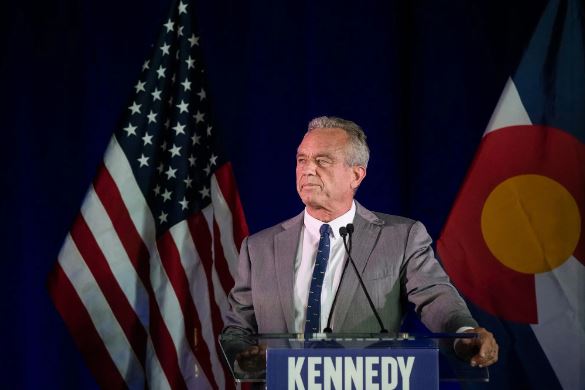On the 56th anniversary of his father’s assassination, Robert F. Kennedy Jr., an independent presidential candidate, renewed his plea for Secret Service protection, citing his elevated risk due to his family history. Speaking on Fox News, Kennedy emphasized, “I was with my dad when he died in Los Angeles in 1968,” referencing the assassination of his father, Robert F. Kennedy, when he was just 14. Kennedy argued that his campaign’s significance and his family’s tragic history warranted the protection.
Despite his repeated requests, the White House has declined to comment on the matter. Kennedy’s appeals for Secret Service protection began over a year ago, predating his independent run. Last July, when he was still competing against President Biden in the Democratic primaries, his request was denied by Alejandro Mayorkas, the Secretary of Homeland Security, who has the authority to grant such protection. Kennedy has persisted in his efforts, including circulating an online petition, but each request has been denied. During his Wednesday interview, he cited several incidents underscoring his need for security, such as break-ins at his California home and a September incident where an armed man was arrested at a campaign event after attempting to meet him.
Secretary Mayorkas has explained that his decisions to deny Kennedy’s requests have been based on the recommendations of a panel of top congressional leaders. “It is ultimately my decision, but I have followed their recommendation each time,” Mayorkas stated in May. The criteria for granting Secret Service protection consider several factors, giving preferential treatment to major-party candidates. For instance, before Nikki Haley ended her Republican presidential campaign, the congressional panel recommended she receive protection due to her national polling strength.
According to the Secret Service guidelines, Democratic or Republican primary candidates must poll at 15 percent or more for 30 consecutive days to be eligible for protection. Independent or third-party candidates face a higher threshold of 20 percent. Currently, Robert F. Kennedy Jr. is polling at an average of 10 percent nationally, according to Real Clear Politics, one of the benchmarks listed in the guidelines.
This polling threshold has historically restricted most third-party or independent candidates from receiving Secret Service protection. However, there have been exceptions. In 1968, George Wallace, the segregationist governor of Alabama, ran as a third-party candidate and was granted a Secret Service detail by President Lyndon B. Johnson after Senator Robert F. Kennedy was assassinated during the Democratic primaries. The expansion of Secret Service protection for presidential candidates followed Senator Kennedy’s death, but rules remain restrictive for third-party candidates. Ross Perot, a notable third-party candidate, did not request Secret Service protection during his presidential campaigns, leaving it unclear whether he would have qualified.
Kennedy argued on Wednesday that candidates with lower polling numbers and less significant risk profiles than his have received Secret Service protection. He cited Jesse Jackson as an example, noting that Jackson, who received a Secret Service detail, had “a tiny fraction of my polling.” However, Jackson ran as a Democrat, not an independent, and at one point during his 1984 campaign, he polled at 20 percent.
Kennedy’s ongoing struggle to secure Secret Service protection highlights the challenges faced by third-party candidates in meeting the criteria set by the Secret Service. His case draws attention to the need for a re-evaluation of these criteria, considering the unique risks faced by candidates like him. As Kennedy continues his campaign, his calls for increased security underscore the legacy of violence that has impacted his family and the broader concerns for candidate safety in the modern political landscape.

